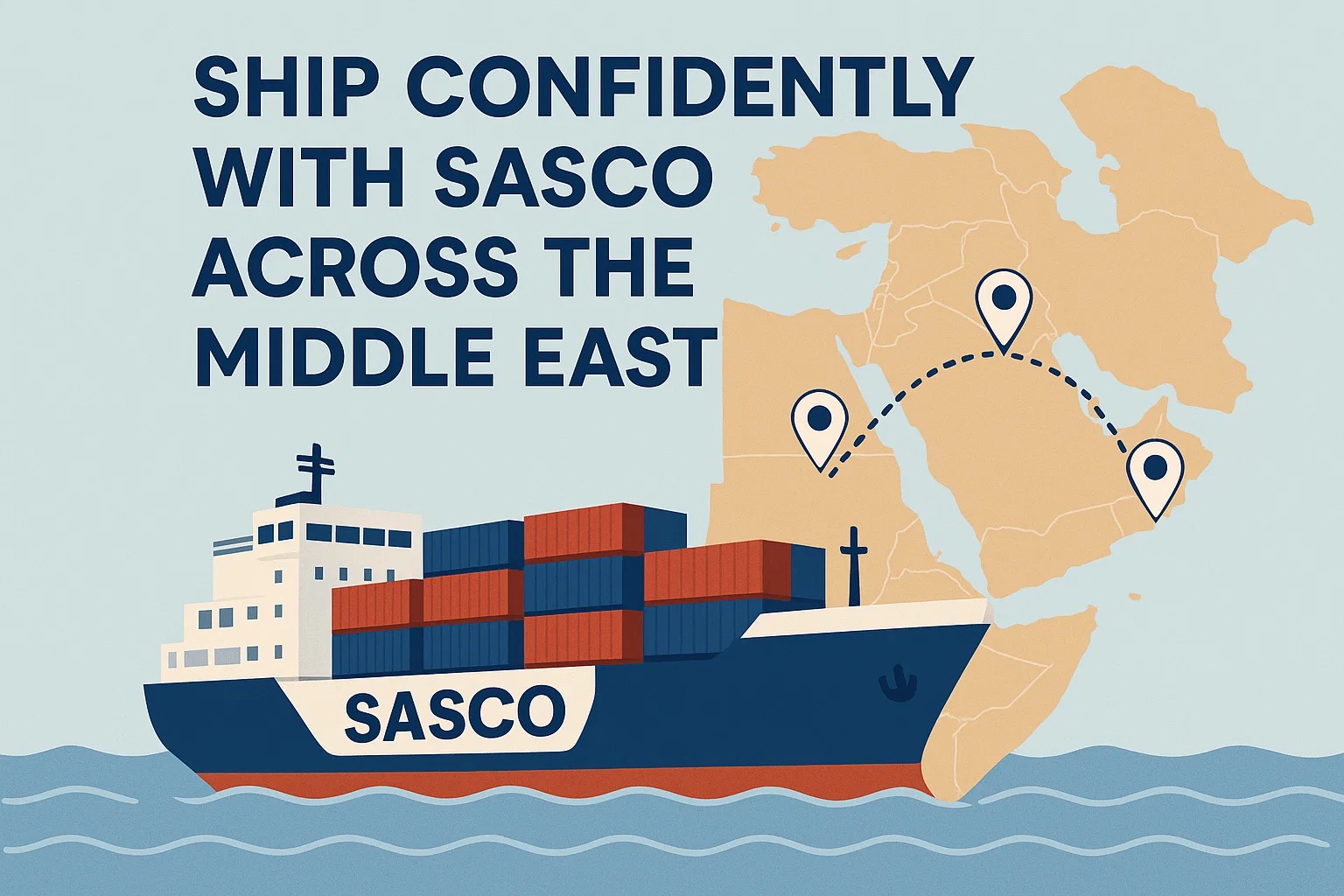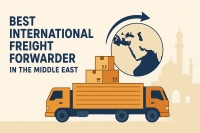Introduction to Freight Forwarding in the Middle East
Choosing the best international freight forwarder in the Middle East matters because this region concentrates the world’s busiest trade arteries and highly integrated logistics infrastructure. The Suez/Red Sea corridor handles ~12% of global trade; when it’s disrupted, flows can drop sharply (the IMF measured a ~50% year-over-year fall in Suez traffic in early 2024), forcing costly Cape detours—precisely where expert forwarders protect lead times and budgets. (AxiosIMF)
On the seafreight side, Dubai’s Jebel Ali anchors Gulf capacity: DP World reports record volumes, with the port handling about 15.5 million TEUs in 2024, nearly 18% of DP World’s global boxes—scale that enables frequent sailings, competitive slot prices, and resilient transshipment. Free-zone adjacency (e.g., JAFZA) adds bonded storage, value-added services, and faster re-export cycles. (Supply Chain DigitalDP WorldJebel Ali Free Zone (Jafza))
Air cargo is equally pivotal for time-critical lanes. Iran’s air freight market was valued at $1.28 billion in 2024 and is projected to reach $2.01 billion by 2033, growing at a CAGR of 4.61%. This expansion is driven by infrastructure developments and improved trade relations(Imarcgroup).
Customs and compliance frameworks also tilt the math. The GCC Common Customs Law standardizes tariffs/procedures across member states, while the expanding TIR regime has cut border transit times across GCC crossings by up to 92%, slashing dwell and variability for road and multimodal moves. (gcc-sg.orgIRU)
Finally, digitized single-window platforms—like Abu Dhabi’s ATLP—integrate ports, airports, customs, and FTZs, improving predictability, document workflows, and milestone visibility. atlp.ae+1Logistics (Performance Index+1)
The region’s mix of chokepoint geography, mega-hub capacity, harmonized customs, TIR-enabled cross-border speed, and digital trade windows is why partnering with a top international freight forwarder in the Middle East can compress transit time, reduce risk, and stabilize landed costs.
Key Factors to Consider When Selecting a Freight Forwarder
Partnering with the right freight forwarder can significantly streamline your supply chain. Understanding the key factors—from experience to technology—helps businesses choose the most reliable and efficient partner in the Middle East.
For businesses seeking reliable logistics partners, this guide on how to choose the best international freight forwarder offers practical insights.
1. Experience and Track Record
Choosing the best international freight forwarder in the Middle East starts with evaluating experience. Companies with years of regional and global operations can navigate complex customs, seasonal fluctuations, and multimodal logistics challenges efficiently. Reviewing the Top Freight Forwarders in Middle East List (2025) and freight forwarders rankings in the Middle East helps identify providers with proven track records.
2. International Network
A strong international network ensures seamless Middle East shipping and global connectivity. Forwarders with extensive partnerships across ports, airlines, and transport operators can offer flexible routing options, faster transit times, and alternatives in case of disruptions.
3. Competitive Freight Rates
While cost is important, the lowest price isn’t always the best choice. The best freight forwarders in the Middle East balance competitive freight rates with value-added services such as customs clearance, cargo insurance, and door-to-door delivery. Forwarders often provide services for full container load (FCL) and less than container load (LCL), giving businesses flexibility depending on shipment size.For smaller shipments, using groupage freight services can be an economical and reliable solution.Optimizing routes and leveraging experienced forwarders is key to cutting freight costs without compromising service quality."
4. Advanced Logistics Technology
Modern freight forwarders use digital platforms for shipment tracking, automated documentation, and real-time notifications. This best global logistics in Middle East capability improves transparency, reduces errors, and optimizes operational efficiency.
5. Customer Support and Consultation
Reliable customer support guides businesses through route optimization, compliance, and unexpected disruptions. Forwarders that provide proactive consultation help maintain timely deliveries and minimize risks.
Top Challenges in Middle Eastern Freight Forwarding
Freight forwarding in the Middle East offers huge opportunities but also comes with specific operational challenges. Understanding these hurdles is essential for selecting the best international freight forwarder in the Middle East and ensuring smooth logistics.
1.Complex Regulatory Frameworks
Customs and import-export regulations vary significantly across countries in the Middle East. Forwarders must navigate multi-layered documentation requirements, differing tariff schedules, and compliance standards. Expertise companies in these frameworks reduces delays, avoids fines, and ensures timely clearance at ports and airports. Also, road transport can be complicated, especially for truck shipments to and from Iran, where customs and border processes require expert handling.
2. Geopolitical and Security Risks
Regional tensions, temporary port closures, or maritime chokepoints can impact shipping schedules and insurance costs. Advanced risk assessment, alternative routing, and strong partnerships with local authorities help forwarders maintain continuity and reliability.
3. Sanctions and Trade Restrictions
Some countries in the region are subject to international sanctions or trade limitations. Forwarders need robust legal and financial compliance mechanisms to process transactions, select payment routes, and manage documentation without violating regulations.
4. Cultural and Commercial Differences
Negotiation styles, business etiquette, and decision-making processes differ across Middle Eastern markets. Building trust, understanding local practices, and adapting communication strategies are essential for smooth operations and long-term partnerships.
What Makes a Freight Forwarder Stand Out in This Region?
The best international freight forwarder in the Middle East distinguishes itself through a combination of experience, network, technology, and customer service.
- Regional and Global Experience
Companies with deep knowledge of Middle Eastern trade lanes can navigate complex regulations, optimize transit routes, and anticipate disruptions. Experienced forwarders understand the nuances of Middle East shipping, making them more reliable than competitors. - Extensive International Network
A broad global and regional network ensures flexibility and faster transit times. For certain routes, particularly those connecting Asia and Europe, Iran’s strategic location and advanced logistics infrastructure make it an optimal hub, giving forwarders operating through Iran a clear advantage. - Competitive Freight Rates and Cost Transparency
While rates matter, top forwarders balance cost efficiency with service quality. Transparent pricing and optimized routing reduce hidden fees and delays, crucial for long-haul shipments across the Middle East. - Advanced Logistics Technology
Forwarders leveraging digital platforms for real-time tracking, automated documentation, and predictive analytics can enhance operational efficiency. This is a key factor for clients seeking best global logistics in Middle East capabilities. - Customer Support and Advisory Services
Reliable consultation helps businesses select the best routes, comply with customs, and manage risks. Iranian freight forwarders, having navigated years of currency fluctuations and sanctions, understand the most cost-effective and secure solutions for the region. By leveraging their expertise and transit services, companies can minimize costs, avoid unnecessary detours, and ensure smooth passage through Middle Eastern routes. - Flexibility and Tailored Solutions
Top freight forwarders offer customized solutions for specific industries or cargo types. Whether it’s temperature-controlled shipments or multimodal logistics, the ability to adapt to client needs is a major differentiator in freight forwarders rankings in the Middle East.

Ship Confidently with SASCO Across the Middle East
When it comes to choosing a reliable and efficient logistics partner, SASCO stands out for its expertise, strategic network, and advanced technology in providing seamless freight solutions across the Middle East.
1. Regional and Global Expertise
SASCO’s team has extensive experience in managing trade lanes across the Middle East, Europe, and Asia. Their familiarity with regional regulations, customs processes, and transit optimization ensures that shipments reach their destinations efficiently, securely, and on time. This expertise also allows them to provide proactive advisory services, helping clients identify the most cost-effective routes while minimizing risks.
2. Strategic Network and Connectivity
Leveraging Iran’s strategic location and a broad network of regional and international partners, SASCO can efficiently handle complex multimodal logistics. For certain routes, especially those linking Asia and Europe, Iranian infrastructure and SASCO’s operational knowledge make the company an ideal hub for transit, reducing costs and simplifying customs clearance.
3. Advanced Technology and Tracking
SASCO utilizes state-of-the-art logistics technology, including real-time shipment tracking, automated documentation, and predictive analytics. This digital infrastructure provides clients with full visibility of their cargo, enhances transparency, and allows for informed, timely decisions.
4. Tailored Solutions and Flexibility
From temperature-controlled shipments to specialized multimodal cargo, SASCO offers customized solutions to meet diverse business needs. Their ability to adapt to specific cargo types and client requirements positions them among the top international freight forwarders in the Middle East.
5. Customer Support and Advisory Services
SASCO provides reliable, proactive consultation to guide businesses through route selection, customs compliance, and risk management. Leveraging years of experience dealing with regional trade complexities, SASCO ensures smooth, secure, and cost-efficient shipping for Middle Eastern and global routes.
Partnering with SASCO guarantees access to comprehensive Middle East shipping solutions, superior logistics capabilities, and the confidence that your cargo is handled by experienced professionals. For businesses seeking seamless international logistics, contact SASCO today to optimize your freight operations and experience reliable, efficient, and fully integrated services.







